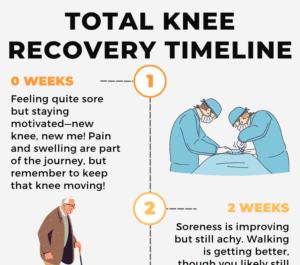Congratulations on completing your knee replacement rehabilitation! This milestone is a testament to your hard work, dedication, and resilience. But recovery doesn’t stop here—ongoing maintenance is crucial to ensure long-term success and keep your knee feeling its best. Here’s a guide to staying active, healthy, and informed for years to come.
Stay Active with Regular Exercise
Why It Matters:
Movement is medicine for your joints. Low-impact activities and strength training help maintain flexibility, reduce stiffness, and support overall fitness. Regular exercise not only keeps your knee functioning well but also benefits your heart, muscles, and mental health.
What to Do:
-
Low-Impact Cardio: Activities like swimming, cycling, or walking are gentle on your knee while boosting endurance and circulation.
-
Strength Training: Incorporate exercises like leg presses, bodyweight squats, and resistance band work to maintain the muscles that support your knee.
-
Flexibility and Balance: Stretch regularly and practice balance drills to keep your knee flexible and stable. Yoga or tai chi can also be excellent options.
Pro Tip: Set realistic goals and create a routine that works for your lifestyle. Consistency is key—think of exercise as a gift to your future self.
Keep Up with Periodic Check-Ups
Why It Matters:
Your orthopedic surgeon is your partner in long-term knee health. Regular check-ups help monitor the performance of your knee replacement and catch potential issues early.
What to Do:
-
Follow your surgeon’s recommended schedule for follow-up visits.
-
Note any unusual symptoms, such as persistent swelling, pain, or instability, and discuss them during your appointments.
-
Use these check-ups to ask questions and gain peace of mind about your progress.
Pro Tip: Don’t wait for an issue to arise—being proactive is the best way to ensure long-term success.
Adopt Healthy Lifestyle Modifications
Why It Matters:
Your lifestyle choices directly impact your knee’s longevity. Managing your weight and avoiding high-impact activities can reduce strain on your joint and enhance your overall health.
What to Do:
-
Weight Management: Maintain a balanced diet rich in lean proteins, fruits, vegetables, and whole grains to support joint health and overall well-being.
-
Low-Impact Alternatives: Instead of running or jumping, stick to activities like elliptical training, rowing, or Pilates to stay active without overloading your knee.
-
Listen to Your Body: Recognize when to rest and avoid pushing through pain to prevent unnecessary stress on your knee.
Pro Tip: Think of your knee replacement as an investment—taking care of it protects your quality of life for years to come.
Ongoing Education and Self-Management
Why It Matters:
Knowledge is empowering. Understanding what’s normal for your knee and recognizing potential warning signs can help you take control of your health and prevent complications.
What to Do:
-
Stay informed about knee health and advancements in care.
-
Monitor your knee for changes, such as increased pain, redness, or reduced mobility, and act promptly if you notice anything unusual.
-
Engage in regular self-checks and follow your physical therapist’s advice for home exercises.
Pro Tip: Small issues can become big problems if left unaddressed. When in doubt, consult your healthcare team.
The Role of Your Physical Therapist
Why It Matters:
Your physical therapist isn’t just for rehab—they’re a lifelong resource. Even after completing formal therapy, they can provide guidance, address concerns, and adapt exercises to meet your changing needs.
What to Do:
-
Schedule periodic sessions to review your progress and adjust your exercise routine.
-
Reach out if you experience any new challenges or setbacks.
-
Use your therapist’s expertise to stay proactive about maintaining strength, flexibility, and balance.
Pro Tip: Think of your physical therapist as your personal coach for long-term success. Their insights can keep you on track and feeling confident.
Therapeutic Edge
Completing rehab is just the beginning of your journey to long-term knee health. By staying active, attending regular check-ups, making healthy lifestyle choices, and continuing your education, you can enjoy the benefits of your knee replacement for decades to come. Remember, your efforts today pave the way for a vibrant, active future. Stay committed, stay informed, and celebrate your ongoing progress.











